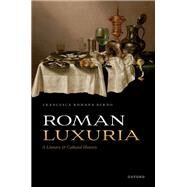Roman Luxuria A Literary and Cultural History
, by Berno, Francesca Romana- ISBN: 9780192846402 | 019284640X
- Cover: Hardcover
- Copyright: 6/17/2023
In classical Latin, luxuria means 'desire for luxury'; it is linked with the ideas of excess and deviation from a standard. It is in most cases labelled as a vice which contrasts with the innate frugal nature of the Romans. Latin authors do not see it as endemic but as an import from the East in the aftermath of military conquests--and as a cause of fatal decline.
Following these etymological and semantic origins, Roman Luxuria: A Literary and Cultural History discusses the influence of Greek culture on the Roman concept and the peculiar characteristics of Roman luxuria. It analyses Roman views on luxuria through close readings in historical order from Cato the Elder, who regards luxuria as the opposite of the ideal Roman way of life, to the Christian poet Prudentius, who represents it in an allegorical fight with Sobriety. The book attends both to key authors and to wider literary genres, such as historiography and satire. Particular consideration is given to the rhetorical device of personification, which can be traced from the first appearances of luxuria in Latin literature to those of late antiquity.
Berno devotes detailed attention to Seneca the Younger, whose work is often preoccupied with this passion. Seneca both defends himself from the charge of luxuria and violently attacks it in others, describing it as the archenemy of a philosophical life. Along the centuries, the focus on luxuria shifts from the economic sphere (and the waste of money) to the erotic, to the extent that in the Christian world it becomes one of the Seven Capital Sins representing the vice of lust.
Following these etymological and semantic origins, Roman Luxuria: A Literary and Cultural History discusses the influence of Greek culture on the Roman concept and the peculiar characteristics of Roman luxuria. It analyses Roman views on luxuria through close readings in historical order from Cato the Elder, who regards luxuria as the opposite of the ideal Roman way of life, to the Christian poet Prudentius, who represents it in an allegorical fight with Sobriety. The book attends both to key authors and to wider literary genres, such as historiography and satire. Particular consideration is given to the rhetorical device of personification, which can be traced from the first appearances of luxuria in Latin literature to those of late antiquity.
Berno devotes detailed attention to Seneca the Younger, whose work is often preoccupied with this passion. Seneca both defends himself from the charge of luxuria and violently attacks it in others, describing it as the archenemy of a philosophical life. Along the centuries, the focus on luxuria shifts from the economic sphere (and the waste of money) to the erotic, to the extent that in the Christian world it becomes one of the Seven Capital Sins representing the vice of lust.







